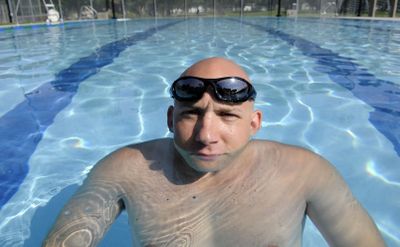Carl Strong
City aquatics supervisor says Spokane urgently needs more lifeguards

In this high-unemployment summer, lifeguard jobs are swimming against the current. Carl Strong, 29, aquatics supervisor for the city of Spokane, still needs 15 to 30 more lifeguards, as well as other pool employees, to meet increased pool attendance at the new A.M. Cannon and Shadle pools and to staff Comstock and Hillyard pools when they open in early August for a pool season that could stretch into the fall.
Q.What do you need to be a lifeguard?
A.You need certification. It’s a 20-plus hour course. You need to be able to swim the front crawl and the breast stroke and know how to do different rescues. You need to have CPR, first-aid and blood-borne pathogen certification. If you go through lifeguard class, you get all those.
Q.To apply for a job, do you have to already have the certification?
A.Not necessarily. If we have applicants we (think) are going to be good employees, we can hire them on the condition they pass the class. If we have enough, we’ll put together a lifeguard certification class.
Q.What makes a good lifeguard beyond the technical skills?
A.I want people who enjoy what they do, who want to make a difference in people’s lives, whether it’s picking up a wrapper on the ground or talking to a child who is having a problem.
Q.What age range are you looking for?
A.You can be a lifeguard at 15, and we also have had active older adults.
Q.What’s the pay range?
A.Minimum wage for aquatic aides. And up to $10.75 (per hour) for the pool managers.
Q.So will the pools be open after school starts?
A.The intention is to get and keep as many pools open as long as we have staff, good weather and people coming to the pools. We’ll keep after-school and weekend hours. I asked (my bosses): “If it’s nice in October and we have people?” They said, “Yup.”
Q.How is lifeguarding a great preparation for other jobs?
A.First, you can always find a job at a pool wherever you go. Second, it’s a people job. Not often do you have a life-or-death situation, but it’s what we always train to. You have to keep your cool, be task-oriented, problem-solve. Those are skills you might use every day in business.
Q.Where did you learn to swim?
A.It was when I was 3 years old, after I almost drowned. We were camping, I went off the dock, straight down, and my grandpa grabbed me out of the water. Right after that, I went to swim lessons in the little Potlatch, Idaho, city pool. I became a pool rat, and so when I was 13 or 14, my mom suggested I become a lifeguard. They had a class at the pool. I took the class. I learned the skills – and have not stopped yet.